Scots polls suggest 'potential revolution' at Westminster
- Published
They have been remarkably stable. Yet they presage a potential revolution in Scottish representation at Westminster.
That has been the story of the polls of voting intentions in Scotland ever since September's independence referendum.
At the end of October last year, Ipsos-MORI put the SNP on no less than 52%, 29 points ahead of Labour.
Since then none of the half a dozen companies that have been taking Scotland's political pulse has put SNP support at less than 41%, while two have repeated the 52% figure.

At the same time none has put Labour on more than 31%, while four have estimated the party's support to be as low as 24%.
These figures represent a stark reversal of the two parties' fortunes at the last Westminster election in 2010.
Then Labour won 42% of the vote, the SNP just 20%.
They imply that on 7 May the SNP might win as many as 50 or so of the 59 Scottish seats at Westminster while Labour might be left with little more than half a dozen, rather than the 41 they won in 2010.
The parties' efforts in the election campaign have apparently made little or no difference to this picture.
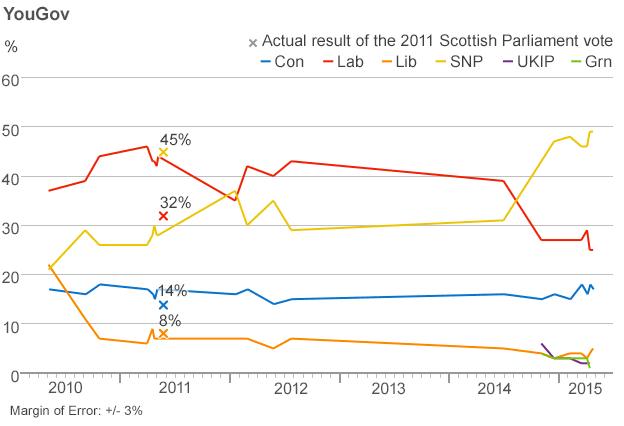
Two polls conducted by YouGov during the last fortnight have both put the SNP on 49% and Labour on 25% - a 24 point gap that is actually a little bigger than had been reported by the company in any of its polls conducted before the campaign got under way at the end of March.
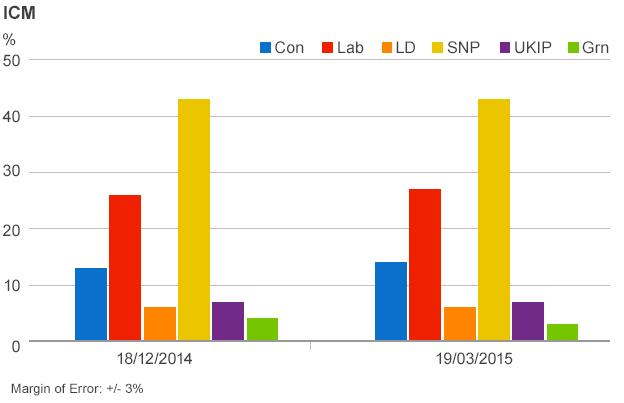
'Lost ground'
However it is not only Labour that apparently face a dramatic turnaround in its Scottish fortunes.
Like their colleagues south of the border, the Liberal Democrats have also lost ground heavily since five years ago.
Then the party won 19% of the vote in Scotland.
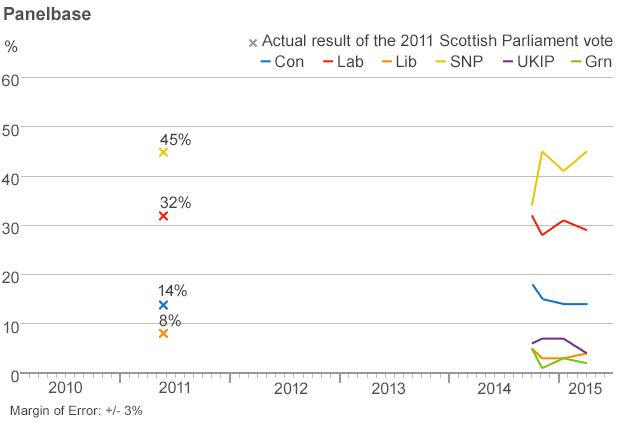
In the last seven months no poll has put the party at more than 7%, while some have put it as low as 3%. It faces the apparent risk of losing nearly all of the 11 seats that it won last time around.
The one party whose fortunes look as though they will be largely unchanged is the Conservative party.
It has won either 16% or 17% of the vote at every Westminster election since and including 1997.
Most polls have put support for party this time around at between 13% and 17%.
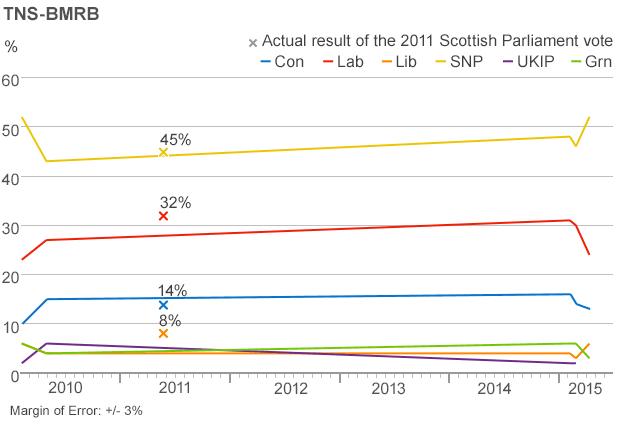
Although it appears that, the Conservatives apart, the fortunes of the parties on 7 May will be very different from five years ago, the outcome to which the polls are currently pointing is not wholly unprecedented.
At the last election for the Scottish Parliament in May 2011, the SNP won 45% of the vote, Labour just 32%. Equally, the Liberal Democrats fell back to no more than 8%.
What has changed is that voters who once were willing to vote for the SNP in a Scottish Parliament election but were rather reluctant to do so in a Westminster contest are now apparently willing to throw their lot in with the SNP on 7 May too.
Polls in Scotland used routinely to find fewer voters saying they would vote for the SNP in a Commons election than they would in one to the Edinburgh parliament.
Now that gap has almost entirely disappeared.
The two most recent YouGov polls, for example, have put SNP support for a Scottish Parliament election at 49% and 51%, more or less the same as the 49% recorded for Westminster.
Referendum turning point
The key reason for this apparent transformation in Scots' voting behaviour lies in last year's referendum.
That ballot - and the interest and fierce debate that it aroused - has ensured that the question of how Scotland should be governed has become the defining issue in voters' minds.
As a result, most seem intent on repeating the view about independence that they expressed last autumn.
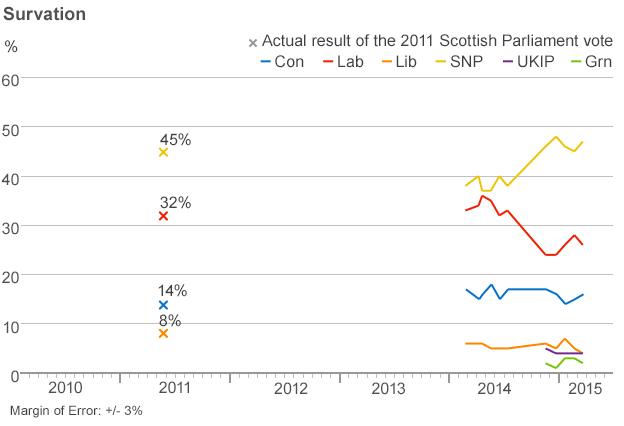
Recent polls suggest that as many as 87% of those who voted in favour of independence last September are now minded to back the SNP.
Conversely, little more than 10% of those who voted against independence now say that they will vote SNP.
Last autumn, the votes of those who backed the Union were all brought together into a single 'No' vote, thereby delivering the 'No' campaign victory.
Now, however, they are divided between Labour and the Conservatives, together with the Liberal Democrats.
That is why - so far at least - the prospects for the SNP now look so very different from what they were just a few short months ago.

The map shows the result of the 27 constituency level opinion polls carried out in Scotland since 1 March 2014. In total, the map displays 166 polls carried out by Lord Ashcroft, Survation, ICM and ComRes. It also includes the results of four by-elections.
Like all polls, these are snapshots, rather than a prediction of what will happen on 7 May and are subject to a +/-3% margin of error which may tip the result in some cases.
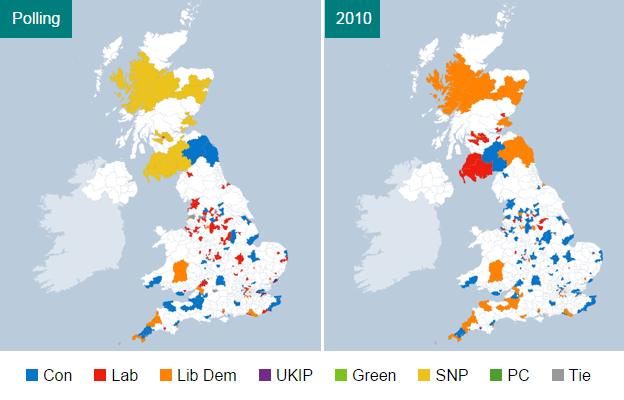
John Curtice is Professor of Politics, Strathclyde University, and Chief Commentator at whatscotlandthinks.org., external
Polling maps & charts produced by BBC Visual Journalism team.

BBC News Timeliner: Scottish independence
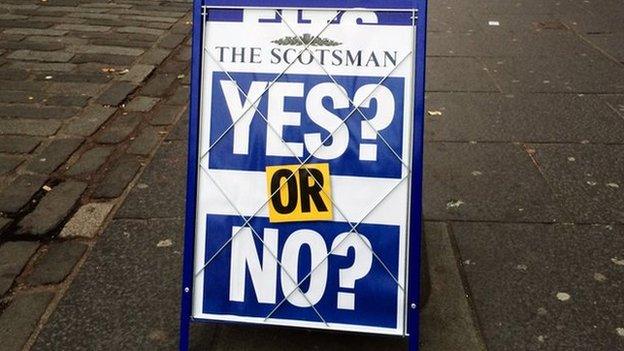
The relationship between politics in Scotland and in the United Kingdom as a whole has changed dramatically since the 1970s, as a quick delve into the BBC archives displays.
Watch video from the vaults on the BBC News Timeliner, external
